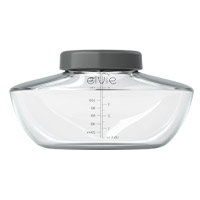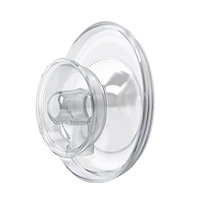Some level of worry is to be expected after having your baby — especially if it’s your first. However, there comes a point in some parents’ journey where the levels of emotional strain don’t fall within a manageable range.
If you’re fretting day in and day out, and your parenting worries have become all-consuming, you’re likely suffering from postpartum anxiety. In this article, we’ll explain everything you need to know about the condition — including what you can do to combat it.
What is postpartum anxiety?
Postpartum anxiety (PPA) is when the usual “new parent nerves” get dialed up to an extreme level. It’s more than just feeling a little worried or stressed. It’s an almost constant sense of fear, unease, or panic that can make everyday life feel overwhelming. You might find your thoughts racing, your heart pounding, or yourself feeling restless and on edge.
A lot of the anxiety tends to focus on your baby — are they okay? Are you doing enough as a parent? But it can also spill over into other areas of life, making it hard to focus or relax. Some parents also deal with intrusive thoughts — unwanted, upsetting ideas that pop into your mind out of nowhere and leave you feeling rattled.
What does postpartum anxiety feel like?
Imagine being stuck in a loop of “what if” scenarios. What if my baby stops breathing in their sleep? What if I’m not feeding them properly? What if I’m not good enough as a parent?
Given the lack of peace and quiet all around you, having this unwelcome soundtrack playing at full blast in your mind can be really tough to deal with.
Physically, postpartum anxiety can feel like your body is always on high alert — a little like someone’s flicked on the fight or flight switch in your head. You might notice tension in your shoulders or jaw, an upset stomach, or an inability to sit still. Sleep might be difficult, too — not because your baby’s refusing to switch off (though that’s always a risk!), but because your brain simply won’t wind down. Not fun.
In a nutshell, postpartum anxiety can be isolating and exhausting in equal measures — but it’s important not to feel guilty for struggling. It’s always best to seek help.
How common is postpartum anxiety?
While postpartum depression often gets more attention, postpartum anxiety is just as common. Studies estimate that around 11-21% of new mums experience postpartum anxiety, although some experts believe the number could be higher due to underreporting
It’s also worth mentioning that postpartum anxiety doesn’t exclusively affect moms. Fathers and non-birthing parents can also experience anxiety after the arrival of a baby, due to the shift in lifestyle, changes in responsibilities, and of course, sleep deprivation. Parenthood is tough, so even if you’re dealing with all the chaos just fine, it’s important to check in with your partner.
What’s the difference between postpartum anxiety and postpartum depression?
They’re often talked about together — and mistakenly confused as one in the same — but PPA and PPD are distinct conditions.
PPD tends to involve feelings of sadness, hopelessness, or a lack of interest in the things you used to enjoy. You might feel disconnected from your baby, or unsure of your ability to care for them or bond with them.
PPA is more to do with fear and worry. It’s a hyper-alert, nervous, jittery feeling. The sensation of always being “on-edge”. That said, the two conditions can overlap, and it’s possible to experience both at once.
It’s also crucial not to confuse the baby blues with either of the conditions mentioned above. Feeling a bit down or tearful in the first week after giving birth is incredibly common, but if your symptoms last longer than two weeks, there’s a strong chance you’re suffering from PPA or PPD.
How long does it take for postpartum anxiety to go away?
There’s no set timeline or recovery period for postpartum anxiety. For some parents the symptoms may ease up after only a few weeks, while for others, the feeling may linger for months — particularly if no help is sought.
Postpartum anxiety can (and should) be treated, so if you’re not feeling like yourself and it’s interfering with your ability to care for your tot and enjoy your new chapter, it’s crucial that you reach out for help sooner rather than later.
What are the symptoms of postpartum anxiety?
Postpartum anxiety can show up in different ways for different people, but some common signs include:
Worrying constantly, especially about your baby’s safety or your parenting skills.
Intrusive thoughts that won’t go away, no matter how hard you try.
Feeling physically tense, like a racing heart, sweaty palms, or a tight chest.
Struggling to concentrate or feeling scatterbrained.
Having trouble relaxing, even when everything seems fine.
Finding it hard to sleep, even when the baby’s sleeping.
If any of this sounds familiar and it’s making life harder than it needs to be, it’s time to think about getting some extra support.
What causes postpartum anxiety?
There’s no single cause of postpartum anxiety. It’s a mix of all kinds of things: hormonal changes, sleep deprivation, and the sheer pressure of taking care of a tiny human. Parenting is a lot.
After giving birth, your hormone levels drop dramatically (particularly your levels of estrogen and progestogen), and this can mess with your mood and make you far more prone to stress.
Lack of sleep is another big one. Being up at all hours with a newborn can leave you feeling frazzled and make it harder to keep your worries in check. And to make matters worse, society’s pressure to be the perfect parent doesn’t help much — especially in the age of social media. Parental doomscrolling is a thing.
Other influencing factors may include a history of anxiety, mental health issues, or a tough birth experience.
What are the risk factors for postpartum anxiety?
Some things can increase your chances of dealing with postpartum anxiety, such as:
A personal or family history of anxiety, depression, or other mental health struggles.
Complications during pregnancy, labour, or delivery.
Having a premature or medically fragile baby.
Not having enough support from family or friends.
Stressful situations, like money troubles or relationship issues.
Challenges with breastfeeding or adjusting to your new role as a parent.
Just because you have one or more of these risk factors doesn’t mean postpartum anxiety is a given, but it’s good to be aware so you can take steps to look after yourself.
Managing postpartum anxiety
Dealing with postpartum anxiety can feel overwhelming , but there are ways to manage the symptoms. Of course, it’s always best to seek professional support, but these factors can help too:
Sleep: Don’t underestimate the power of sleep. It’s easier said than done with a newborn, but even short naps can make a big difference. Try swapping shifts with a partner or asking a friend or family member to help out so you can grab some rest.
Talking it out: Talking to someone you trust is also huge. Whether it’s a partner, friend, or therapist, sharing how you’re feeling can lighten the load. If therapy feels like a good step, look into postpartum specialists who can guide you through tailored strategies to manage anxiety.
Deep breathing: Deep breathing exercises or mindfulness practices can be game-changers for calming your racing mind. Even just a few minutes a day of focused breathing or guided meditation can help reset your stress levels.
Being fair to yourself: Set realistic expectations for yourself. You don’t have to be a perfect parent (spoiler: nobody is!). Focus on small wins, like accomplishing a household chore or getting your baby off to sleep soundly, and try to let go of the pressure to do it all.
Postpartum anxiety is tough, but it’s so important not to suffer through it alone. Talk to your friends, lean on your family, and take things one day at a time. With time things will get better, but in the meantime, don’t be afraid to seek help.











 7 minute read
7 minute read